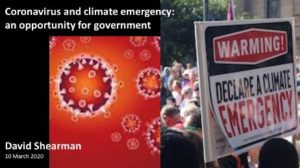
Together, the COVID-19 (coronavirus) and the climate change emergency offer humanity a unique opportunity for economic reform.
For Australia, already suffering from the economic downturn due to fire and drought, COVID-19 is compounding the problem by further reducing tourism, trade and international education. And economic growth around the world is already slowing.
In the major stock market correction of 2008, the steadily rising annual growth rate of global carbon dioxide emissions fell by half as a result of the reduced consumption of fossil fuels and industrial activity. When growth returned so did emissions, and their relentless rise has continued since.
In January and February of this year, NASA and the European Space Agency (ESA) pollution monitoring satellites detected significant falls in nitrogen dioxide (NO2) over China as a measure of both greenhouse emissions and air pollution. Nitrogen dioxide is a short-acting climate forcer and its control is essential. In China, carbon dioxide, the main greenhouse gas, has reduced by a quarter.
World oil consumption suffered its steepest decline on record in the first quarter of this year, greater than during the 2008 global financial crisis (GFC), as offices and schools closed and airlines cancelled flights worldwide.
Oil producers are experiencing the biggest drop in demand for their product ever as the coronavirus spreads around the world, forcing OPEC and its allies to consider emergency measures.
It is good for human health that these reductions will reduce greenhouse emissions and air pollution, though temporarily.
The mantra of growth
Now that Australians understand the terrible impacts of global warming, the question arises whether we can curb our addiction to GDP growth, for we must now accept the conclusion that unbridled economic growth in its present form is incompatible with the environmental future of the world, which includes us.
This is not a new message to governments blinded by a heroin-like-addict- ion to GDP growth. In 1974, “Nobel” economics prize winner William Nordhaus described the necessary transit- ion from a “cowboy economy” to a “spaceship economy”. “Cowboy economy” because we use the environment as a sink that could never be fouled. “Spaceship economy” because great attention must be paid “to the sources of life and to the dumps where our refuse is piled”.
As for one such dump, atmospheric carbon dioxide, Nordhaus predicted in 1974 that we were now dangerously on track to carbon dioxide emissions of 487 parts per million by 2030. Clearly now an overestimate, but our leaders are doing their best to reach it with their daily chorus of “jobs and growth”.
COVID-19 is likely to cause thousands of deaths around the world and we have the will and expertise to control it. But climate change is already causing hundreds and thousands of deaths each year and we see only prevarication and deception. We know what is necessary but are retarded by the growth-addicted minds of governments.
Economic development must now be decoupled from greenhouse emissions. The federal government may not realise that its commendable initiative to recycle plastic is part of the Green New Deal that has been proposed by the European community. Perhaps it should not be mentioned in case others within the governing parties decide to sabotage it.
Indeed, the decoupling might not be sufficient to save humanity from its own destruction, but at least it offers a learning transition to a completely new and sustainable way of living.
Every one of us prioritises our own health and the health and wellbeing of our children. The forthcoming stimulus package is an opportunity for the “jobs and growth” message to be changed to “jobs and health”.
Jobs, health and financial stimulus
Current vehicle emissions cause about half the 3,000 deaths per annum from air pollution in Australia and many of our cities carry the proven burden of ill health, particularly for the very young and old. A generous subsidy for electric vehicle purchase would boost falling car sales and jobs in the flagging automotive sector. It would fire a necessary transition based on health orientated consumption.
The transition to renewable energy has stalled, yet it is a jobs and health initiative because it reduces air pollution. Country electorates have the most disadvantaged people, the poorest health and the worst health services. Their parliamentary representatives have done little about it.
Most of these communities need a hall or building that could become solar powered and have a storage facility to ease the burden of heatwaves and the increasing death rate from heatstroke. This simple policy would become part of national climate adaptation policy — when we have one. Grants for jobs and health where needed most — for country people who provide the true sustainability of Australia.
Most urgently, in health terms, it was obscene to reduce interest rates as a stimulus for a dubious increase in consumption, while ignoring the hunger and deprivations of Newstart. Newstart recipients are hungry and in despair; Government policy condemns many to ill health and frequent use of health services. A Newstart increase would be an immediate boost for the economy via the food industry.
Finally, both COVID-19 and climate change should remind the Government that all nations are interdependent and need to work together. Part of our obligation to underdeveloped nations suffering from both emergencies should be to increase aid, not reduce it.
Source: Independent Australia, 10/3/20
Reproduced with the author’s permission.
Dr David Shearman AM is Emeritus Professor of Medicine at Adelaide University and a patron of Economic Reform Australia.






























